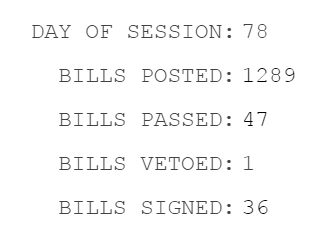April 02,2019 | TRIADVOCATES

1. While last week was the final deadline to hear bills in committee, there’s an exception for the Appropriations Committee in both chambers. Over the next couple days, there will be a mad scramble to resurrect ideas through the infamous “striker” amendment strategy. For all you baseball fans, we’re in the bottom of the sixth inning. Let’s hope the vendors don’t run out of beer or peanuts just yet—there’s still a lot of game left to be played.
2. On Friday, the House Ethics Committee released a bombshell report revealing more information about charges against former Arizona Rep. David Stringer, who resigned less than 24 hours before the documents were released. (It’s impossible to go into much detail without using words that would literally get this email flagged as inappropriate, so, if you haven’t read the news about David Stringer, go ahead and Google…or Bing…it.) Yesterday, Yavapai County Republicans met to debate who should replace him for the District 1 seat. The three Republican finalists are former Arizona Senate President Steve Pierce, GOP field organizer Steven Sensmeier and former Arizona Secretary of State Ken Bennett. Pierce, who has been the clear frontrunner, will not seek to keep the seat after completing the remainder of the current term but already knows how to navigate the chaos of the Legislature. The Yavapai County Board of Supervisors will formally select the appointee on Wednesday at 9 a.m. Until then, the House will remain in recess. Without Stringer’s replacement, Republicans only have a razor-thin 30-29 majority—apparently much, much too close for comfort.
3. Political maneuvers, House-versus-Senate power struggles and arm-twisting—just your average day down at the Capitol this session. Much to the chagrin of several members of the Senate, House Speaker Rusty Bowers has decided to kill several divisive bills that came out of the opposite chamber. For the moment, measures concerning charter school reform, new tuition rates for DREAMers and a repeal of last year’s controversial car registration fee increase appear to be dead. However, we don’t expect these to go down without a fight from Senate leadership, who have already started devising plans to ensure the proposals receive equal treatment. We expect some of these ideas to be revived, amended onto other bills or squeezed into the budget. Yogi Berra was right—it ain't over till it's over.
4. After endless speculation, Congressman Ruben Gallego has announced that he will not run for U.S. Senate in 2020. For several months, rumors swirled that Gallego, who has served in Congress since 2014, would seek to become the first elected Hispanic U.S. Senator in Arizona. Last week, he officially declined to run for the seat, likely avoiding a contentious fight against Mark Kelly for the Democratic nomination to finish John McCain’s last term. Identified by national groups as a toss-up, the race for that seat is expected to be one of the most contested general races in 2020 as Democrats pursue to gain a majority in the U.S. Senate.
5. Last week, Kate Gallego was officially sworn in as mayor of Phoenix. Her first week in office has been focused on housing, economic development and building an “inclusive, innovative” Phoenix that works for all its residents. Gallego has tapped Lisa Fernandez to serve as her chief of staff.
In other City of Phoenix news, voters in District 5 and District 8 also got the chance to elect new councilmembers, as Gallego and her electoral opponent, Danny Valenzuela, resigned late last year to run for mayor. There were several candidates in each district race, and because no candidate received a majority of votes, we’re headed toward a runoff for the two available council seats. On May 21, District 5 voters will choose between Betty Guardado and incumbent Vania Guevara, and District 8 voters will choose between Carlos Garcia and Mike Johnson.




Republican Rep. Bob Thorpe on a bill regarding unpaid cafeteria fees for students:
“If kids are ridiculed at school, doesn’t this make them tougher and now better prepared to serve in the Legislature?”

"COW"
Once a bill goes through committee, Rules and Caucus, it is ready for the "Committee of the Whole" — commonly referred to as "COW" — when the whole House (or Senate) meets to discuss a proposal. During COW, individual members can offer amendments, which are voted upon by voice vote as they are offered. The bill’s sponsor then motions for a vote. If the COW votes in favor, the bill moves on. If the COW votes against, the bill reverts to its "pre-COW" status and is up for debate, but is usually dead. With some exceptions (for non-contentious measures), a bill must go through COW before it can be formally considered by the full chamber.
“The bill was amended in COW and awaits a final vote."
“Stakeholders were still trying to reach a compromise when the bill went through committee, so it will need to be further amended in COW."
